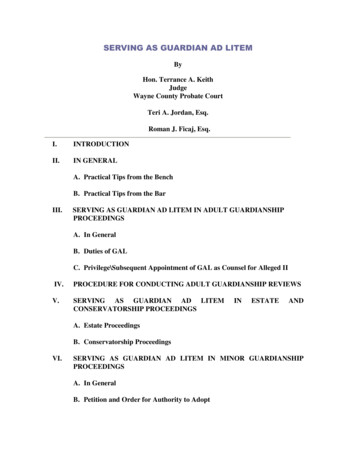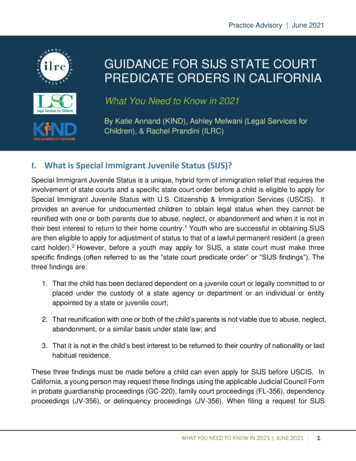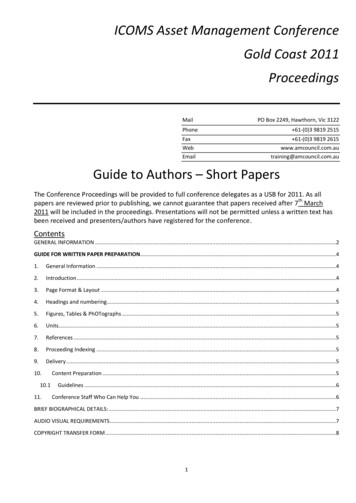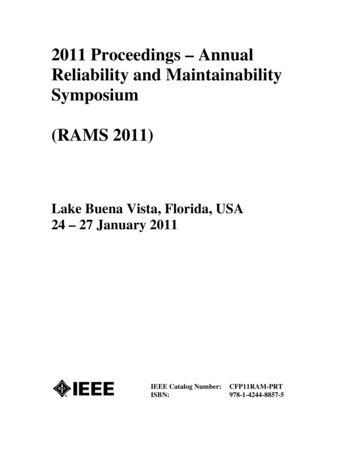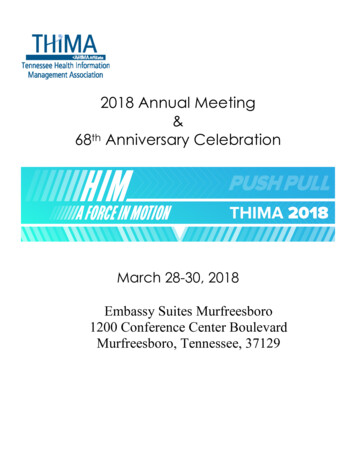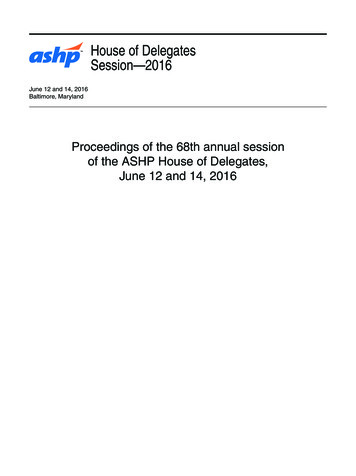
Transcription
House of DelegatesSession—2016June 12 and 14, 2016Baltimore, MarylandProceedings of the 68th annual sessionof the ASHP House of Delegates,June 12 and 14, 2016
PROCEEDINGS OF THE 68TH ANNUAL SESSIONProceedings of the 68th annual session of theASHP House of Delegates, June 12 and 14, 2016Paul W. Abramowitz, SecretaryThe 68th annual session of the ASHP House of Delegateswas held at the Baltimore Convention Center, in Baltimore,Maryland, in conjunction with the 2016 Summer Meetings.President 2017–2018First meetingKelly M. Smith, Pharm.D., FASHP, FCCP, Professor andInterim Dean, University of Kentucky College of Pharmacy,Lexington, KYPaul W. Bush, Pharm.D., M.B.A., BCPS, FASHP, ChiefPharmacy Officer, Duke University Hospital, Durham, NCThe first meeting was convened at 1:00 p.m. Sunday, June12, by Chair of the House of Delegates Amber J. Lucas.Chair Lucas introduced the persons seated at the headtable: Christene M. Jolowsky, Immediate Past President ofASHP and Vice Chair of the House of Delegates; John A.Armitstead, President of ASHP and Chair of the Board ofDirectors; Paul W. Abramowitz, Chief Executive Officer ofASHP and Secretary of the House of Delegates; and SusanEads Role, Parliamentarian.Board of Directors, 2017–2020Stephen F. Eckel, Pharm.D., M.H.A., BCPS, FASHP, Associate Dean for Global Engagement, Clinical Associate Professor, and Vice Chair of Graduate and Postgraduate Education,UNC Eshelman School of Pharmacy, Chapel Hill, NCSeena L. Haines, Pharm.D., BCACP, BC-ADM, CDE, FASHP,FAPhA, Professor and Chair, Department of Pharmacy Practice, University of Mississippi School of Pharmacy, Jackson, MSChair Lucas welcomed the delegates and described the purposesand functions of the House. She emphasized that the Househas considerable responsibility for establishing policy related toASHP professional pursuits and pharmacy practice in hospitalsand health systems. She reviewed the general procedures andprocesses of the House of Delegates.Nishaminy Kasbekar, B.S., Pharm.D., FASHP, CorporateDirector of Pharmacy, University of Pennsylvania HealthSystem, Director of Pharmacy Services, Penn PresbyterianMedical Center, Philadelphia, PALinda S. Tyler, Pharm.D., FASHP, Chief Pharmacy Officer,University of Utah Health Care, Salt Lake City, UTThe roll of official delegates was called. A quorum was present,including 201 delegates representing 49 states and the Districtof Columbia and Puerto Rico (no delegates from Hawaii werepresent), as well as the federal services, chairs of ASHP sectionsand forums, ASHP officers, members of the Board of Directors, and ASHP past presidents (see Appendix I for a completeroster of delegates).A “Meet the Candidates” session to be held on Monday, June13, was announced. Chair Lucas announced the candidates forthe executive committees of the five sections of ASHP.Policy committee reports. Chair Lucas outlined the process used to generate policy committee reports (AppendixIV). She announced that the recommended policies fromeach council would be introduced as a block. She furtheradvised the House that any delegate could raise questionsand discussion without having to “divide the question” andthat a motion to divide the question is necessary only whena delegate desires to amend a specific proposal or to take anaction on one proposal separate from the rest of the report;requests to divide the question are granted automaticallyunless another delegate objects. Chair Lucas reminded delegates that policies not separated by dividing the questionwould be voted on en bloc before the House considered theseparated items.Chair Lucas reminded delegates that the report of the 67thannual session of the ASHP House of Delegates had beenpublished on the ASHP Web site and had been distributed toall delegates. Delegates had been advised earlier to review thisreport. The proceedings of the 67th House of Delegates sessionwere received without objection.Report of the Committee on Resolutions. President Armitsteadpresented the Report of the Committee on Resolutions(Appendix II). Debate and action on the Report took place atthe second meeting of the House.Report of the Committee on Nominations. Chair Lucas calledon Leigh Briscoe-Dwyer for the report of the Committee onNominations (Appendix III).a Nominees were presented asfollows:Chair Lucas also announced that delegates could suggest minorwording changes (without introducing a formal amendment)that did not affect the substance of a policy proposal, and thatthe Board of Directors would consider these suggestions andreport its decisions on them at the second meeting of the House.1
PROCEEDINGS OF THE 68TH ANNUAL SESSION(Note: The following reports on House action on policy committee recommendations give the language adopted at the firstmeeting of the House. The titles of policies amended by theHouse are preceded by an asterisk [*]. Amendments are notedas follows: italic type indicates material added; strikethroughmarks indicate material deleted. If no amendments are noted,the policy as proposed was adopted by the House. For purposesof this report, no distinction has been made between formalamendments and wording suggestions made by delegates.To advocate that pharmacists lead efforts to prevent inappropriate use of antipsychotic drugs, including engaging in strategiesto detect and address patterns of use in patient populations atincreased risk for adverse outcomes.*3. Safety of Epidural Steroid InjectionsTo encourage healthcare providers to 1) inform patients aboutthe significant risks and potential lack of efficacy of associatedwith epidural steroid injections, and 2) request their informedconsent, and 3) inform patients of alternative therapies and theirrisks and benefits; further,The ASHP Bylaws [Section 7.3.1.1] require the Board ofDirectors to reconsider an amended policy before it becomesfinal. The Board reported the results of its “due consideration” of amended policies during the second meeting ofthe House; see that section of these Proceedings for the finaldisposition of amended policies.)To encourage healthcare organizations to prevent adverse eventsrelated to epidural steroid injections by having pharmacistsinvolved in the development of protocols that promote the safeuse of such injections.To recommend pharmacist involvement in the medication-useprocess associated with epidural steroid injections in cases wheremedically necessary.Timothy R. Brown, Board Liaison to the Council on Therapeutics, presented the Council’s Policy Recommendations 1through 6.*4. Drug Dosing in Renal Replacement TherapyTo encourage research on the pharmacokinetics and pharmacodynamics of drug dosing in renal replacement therapy; further,*1. Stewardship of Drugs with Potential for AbuseTo encourage stewardship of drugs with potential for abuse;further,To support development and use of standardized models ofassessment of the pharmacokinetics and pharmacodynamicsof drug dosing in renal replacement therapy; further,To advocate for the inclusion of a clinically appropriate indication of use, the intended duration, and the goals of therapy whenprescribing drugs with potential for abuse; further,To collaborate with stakeholders in enhancing aggregation andpublication of data on the pharmacokinetics and pharmacodynamics of drug dosing in renal replacement therapy.To encourage pharmacists to engage in interprofessional effortsto promote the appropriate, but judicious, use of drugs with thepotential for abuse, including education, monitoring, assessmentof clinical progress, and discontinuation of therapy or dose reduction, where appropriate; further,*5. Use of Methadone to Treat PainTo acknowledge that methadone has a role in pain managementand that its pharmacologic properties present unique risks topatients; further,To advocate that pharmacists lead efforts to prevent inappropriateuse of drugs with potential for abuse, including engaging in strategies to detect and address patterns of use in patient populationsat increased risk for adverse outcomes; further,To oppose the payer-driven use of methadone as a preferredtreatment option for acute and chronic pain; further,To advocate that all healthcare practitioners who prescribeor dispense methadone complete a standardized educationalprogram specific to the drug; further,To facilitate the development of best practices for prescription drug monitoring programs and drug take-back disposalprograms for drugs with potential for abuse.To advocate that pain management experts, payers, andmanufacturers collaborate to provide educational programsfor healthcare professionals on treating acute and chronicpain with opioids, including the proper place in therapy formethadone; further,*2. Appropriate Use of Antipsychotic Drug TherapiesTo advocate for the documentation of appropriate indicationand goals of therapy to promote the judicious use of antipsychotic drugs and reduce the potential for harm; further,To support the participation of pharmacists in the management of antipsychotic drug use, which is an interdisciplinaryinterprofessional, collaborative process for selecting appropriate drug therapies, educating patients or their caregivers andmonitoring patients, continually assessing outcomes of therapy,and identifying opportunities for appropriate discontinuationor dose adjustment; further,To advocate that all facilities that dispense methadone, including addiction treatment programs, participate in state prescription drug monitoring programs.*6. Therapeutic Indication of PrescribingTo advocate that healthcare organizations optimize use ofclinical decision support and prescribing systems by structuringthem to include the appropriate indication for high-risk andproblem-prone medications.2
PROCEEDINGS OF THE 68TH ANNUAL SESSIONDonald E. Letendre, Board Liaison to the Council on Education and Workforce Development, presented the Council’sPolicy Recommendations 1 through 5.To foster leadership skills for pharmacists to use on a daily basisin their roles as leaders in patient care.This policy supersedes ASHP policy 1518.1. Pharmacy Technician Training and CertificationTo advocate that Pharmacy Technician Certification Board(PTCB) certification be required for all pharmacy technicians;further,*4. Interprofessional Education and TrainingTo support interprofessional education as a component ofdidactic and experiential education in Doctor of Pharmacydegree programs; further,To advocate that all pharmacy technicians maintain PTCBcertification; further,To support interprofessional education, mentorship, and professional development for student pharmacists, residents, andpharmacists; further,To support the position that by the year 2020, the completionof a pharmacy technician training program accredited by ASHPand the Accreditation Council for Pharmacy Education (ACPE)be required to obtain PTCB certification for all new pharmacytechnicians; further,To encourage and support pharmacists’ collaboration withother health professionals and healthcare executives in thedevelopment of interprofessional, team-based, patient-centeredcare models; further,To foster expansion of ASHP-ACPE accredited pharmacytechnician training programs.To foster documentation and dissemination of outcomesachieved as a result of interprofessional education of healthcareprofessionals.This policy supersedes ASHP policy 1519.*2. Career Opportunities for Pharmacy TechniciansTo promote the image of pharmacy technicians as valuablecontributors to healthcare delivery; further,(Note: This policy would supersede ASHP policy 1014.)*5. Cultural Competency and Cultural DiversityTo endorse foster the development of cultural competency ofwithin the pharmacy workforce educators, practitioners, residents, students, and technicians; further,To develop and disseminate information about career opportunities that enhances the recruitment and retention of qualifiedpharmacy technicians; further,To educate healthcare providers on the importance of providingculturally congruent care to achieve quality care and patientengagement; further,To support pharmacy technician career advancement opportunities, commensurate with training and education; further,To encourage compensation models for pharmacy techniciansthat provide a living wage.To advocate for an ethnically and culturally diverse workforce.(Note: This policy would supersede ASHP policy 1414.)(Note: This policy would supersede ASHP policy 0211.)3. Developing Leadership CompetenciesTo work with healthcare organization leadership to foster opportunities, allocate time, and provide resources for pharmacypractitioners to move into leadership roles; further,Lea S. Eiland, Board Liaison to the Council on PharmacyManagement, presented the Council’s Policy Recommendations 1 through 4.To encourage leaders to seek out and mentor pharmacy practitioners in developing administrative, managerial, and leadership skills; further,*1. Controlled Substance Diversion and Patient AccessTo enhance awareness by pharmacists pharmacy personnel,healthcare providers, and the public of drug diversion andabuse of controlled substances; further,To encourage pharmacy practitioners to obtain the skills necessary to pursue administrative, managerial, and leadershiproles; further,To advocate that pharmacists the pharmacy profession take aleadership role in national lead collaborative efforts to reducethe incidence of controlled substance abuse; further,To encourage colleges of pharmacy and ASHP state affiliates tocollaborate in fostering student leadership skills through development of co-curricular leadership opportunities, leadershipconferences, and other leadership promotion programs; further,To advocate that pharmacists lead collaborative efforts byorganizations of healthcare professionals, patient advocacy organizations, and regulatory authorities to develop and promotebest practices for preventing drug diversion and appropriatelyusing controlled substances to optimize and ensure patient access and therapeutic outcomes; further,To reaffirm that residency programs should develop leadershipskills through mentoring, training, and leadership opportunities; further,3
PROCEEDINGS OF THE 68TH ANNUAL SESSIONTo advocate that the Drug Enforcement Administration andother regulatory authorities interpret and enforce laws, rules,and regulations to support patient access to appropriate therapies, minimize burdens on pharmacy practice, and providereasonable safeguards against fraud, misuse, abuse, and diversion of controlled substances; further,To educate pharmacists and pharmacy personnel about therelationship between patient satisfaction experience and positivehealth outcomes; further,To develop or adopt tools that will (1) provide a system formonitoring trends in the quality of pharmacy services topatients, (2) increase recognition of the value of pharmacyservices, and (3) provide a basis for making improvementsin the process and outcomes of pharmacy services in effortsto engage patients and improve satisfaction their experience;further,To encourage healthcare organizations to establish advocateestablishment of programs to support patients and personnelwith substance abuse and dependency issues.*2. Protecting Workers from Exposure to Hazardous DrugsTo advocate that pharmaceutical manufacturers eliminatesurface contamination on packages and vials of hazardousdrugs; further,To facilitate a dialogue with and encourage education of nationalpatient satisfaction experience database vendors on the roleand value of clinical pharmacy services to include the value ofpharmacists and pharmacy services in patient experience.To inform pharmacists and other personnel of the potentialpresence of surface contamination on the packages and vialsof hazardous drugs; further,(Note: This policy would supersede ASHP policy 0104.)To advocate that the Food and Drug Administration requirestandardized labeling and package design for hazardous drugsthat would alert handlers to the potential presence of surfacecontamination; further,Ranee M. Rannebaum, Board Liaison to the Council onPharmacy Practice, presented the Council’s Policy Recommendations 1 through 4.*1. Automated Preparation and Dispensing Technology forSterile PreparationTo encourage advocate that health systems to adopt automation and information technology for preparing and dispensing compounded sterile preparations when such adoption is(1) planned, implemented, and managed with pharmacists’involvement; (2) implemented with adequate resources topromote successful development and maintenance; and (3)supported by policies and procedures that ensure the safety,effectiveness, and efficiency of the medication-use process;further,To encourage healthcare organizations, wholesalers, and othertrading partners in the drug supply chain to adhere to publishedstandards and regulations, such as United States PharmacopeiaChapter 800, to protect workers from undue exposure to hazardous drugs.(Note: This policy would supersede ASHP policy 0618.)3. Pharmaceutical Distribution Systems (withdrawn)In Council on Pharmacy Management (CPM) policy recommendation 3, Pharmaceutical Distribution Systems, the Councilrevised ASHP policy 1016 to add the following clause:To educate patient safety advocacy groups and regulatoryagencies on the capabilities and benefits of automation andtechnology for preparing and dispensing compounded sterilepreparations, and to encourage them to establish expectationof adoption by health systems; further,To encourage wholesalers and other trading partners in thedrug supply chain to implement policies and procedures consistent with United States Pharmacopeia (USP) Chapter 800in order to mitigate the risk of hazardous drug exposure asproducts move through the supply chain.To foster further research, development, and publication of bestpractices regarding automation and information technology forpreparing and dispensing sterile preparations.The House of Delegates determined that the additional language was better suited to CPM policy recommendation 2,Protecting Workers from Exposure to Hazardous Drugs, andamended that policy recommendation to incorporate the concepts in the new clause. Removing the now-redundant languagefrom CPM policy recommendation 3 would result in a policyidentical to existing ASHP policy 1016, so CPM policy recommendation 3 was withdrawn, with the result that ASHP policy1016 will remain ASHP policy.*2. Integrated Approach for the Pharmacy EnterpriseTo advocate that pharmacy department leaders promote anintegrated team approach for all pharmacy professionalspersonnel involved in the medication-use process; further,To advocate a high level of coordination of all components ofthe pharmacy enterprise across the continuum of care for thepurpose of optimizing (1) medication-use safety, (2) quality,(3) outcomes, and (4) the value of drug therapy; further,*4. Patient ExperienceTo encourage pharmacists to evaluate their practice settingsfor opportunities to improve the level of satisfaction experiencepatients have with healthcare services and with the outcomesof their drug therapy; further,To encourage pharmacy department leaders to develop andmaintain patient-centered practice models that integrate intoa team all pharmacy professionals engaged in the medication4
PROCEEDINGS OF THE 68TH ANNUAL SESSION*2. Timely State Board of Pharmacy LicensingTo advocate that the National Association of Boards of Pharmacy (NABP) collaborate with state boards of pharmacy tostreamline the licensure process through standardization andimprove the timeliness of application approval; further, [clausemoved here from lower down]use process, including general and specialized clinical practice,drug-use policy, product acquisition and inventory control,product preparation and distribution, and medication-usesafety and other quality initiatives.(Note: This policy would supersede ASHP policy 0619.)*3. Preventing Exposure to AllergensTo advocate for pharmacy participation in the collection, assessment, and documentation of a complete list of allergenspertinent to medication therapy, including food, excipients,medications, devices, and supplies, for the purpose of clinicaldecision-making; further,To advocate that the National Association of Boards of Pharmacy (NABP) collaborate with state boards of pharmacy andany third-party vendor to streamline the licensure reciprocityprocess; further,To advocate that state boards of pharmacy grant temporarylicensure to pharmacists who are relocating seeking reciprocity from another state jurisdiction in which they hold a licensein good standing, permitting them to engage in practice whiletheir application for licensure reciprocity is being processed;further,. [clause moved here from higher up]To advocate that vendors of medication-related databases incorporate and maintain information about medication-relatedallergens and cross-sensitivities; further, [clause moved herefrom lower down]To advocate that pharmacy departments pharmacists activelyreview allergens pertinent to medication therapy and minimizepatient and healthcare worker exposure to known allergens, asfeasible; further,(Note: This policy would supersede ASHP policy 0612.)3.Inclusion of Drug Product Shortages in State Pricegouging LawsTo urge state attorneys general to consider including shortagesof lifesaving drug products within the definition of events thattrigger application of state price-gouging laws.To advocate that pharmacy departments be actively involvedsoliciting information about patient food and environmentalallergies that may indicate a potential for medication interaction or adverse event; further,*4. Home Intravenous TherapyTo support the continuation of a home intravenous therapybenefit under federal and private health insurance plans, and expand expansion of the home infusion benefit under Medicare atan appropriate level of reimbursement for pharmacists’ patientcare services provided, medications, supplies, and equipment.To encourage pharmacist pharmacy personnel education onmedication-related allergens.4. Accreditation of Compounding FacilitiesTo discontinue ASHP policy 0617 which reads:(Note: This policy would supersede ASHP policy 0414.)To encourage facilities where extemporaneous compoundingof medications occurs to seek accreditation by a nationallycredible accreditation body.5. Drug Product ShortagesTo discontinue ASHP policy 1118 which reads:To advocate that the Food and Drug Administration (FDA) havethe authority to require manufacturers to report drug productshortages and the reason(s) for the shortage, and to make thatinformation available to the public; further,Kelly M. Smith, Board Liaison to the Council on Public Policy,presented the Council’s Policy Recommendations 1 through 6.*1. Off-Label Promotion by Pharmaceutical ManufacturersTo advocate for authority for the Food and Drug Administration(FDA) to regulate the promotion and dissemination of information about off-label uses of medications and medicationcontaining devices by manufacturers and their representatives;further,To strongly encourage the FDA to consider, in its definition of“medically necessary” drug products, the patient safety risks created by use of alternate drug products during a shortage; further,To support government-sponsored incentives for manufacturers to maintain an adequate supply of medically necessary drugproducts; further,To advocate that such off-label promotion and marketing belimited to the responsible FDA-regulated dissemination ofunbiased, truthful, non-misleading, and scientifically accurateinformation based on authoritative, peer-reviewed literaturenot included in the New Drug Approval process.To advocate laws and regulations that would (1) require pharmaceutical manufacturers to notify the appropriate governmentbody at least 12 months in advance of voluntarily discontinuinga drug product, (2) provide effective sanctions for manufacturers that do not comply with this mandate, and (3) requireprompt public disclosure of a notification to voluntarily discontinue a drug product; further,(Note: This policy would supersede ASHP policy 1120.)5
PROCEEDINGS OF THE 68TH ANNUAL SESSION4.1.3. The candidates for Treasurer shall be nominatedby the Board of Directors and elected by the active members for a term of office of three years.No person shall serve more than two successiveterms as Treasurer.4.1.4. Each officer shall be installed at the yearly meetingof the House of Delegates.4.1.5. The President, President-elect, Immediate PastPresident, and Treasurer are not charged withexecutive or administrative responsibility for themanagement or conduct of the internal affairs ofASHP.To encourage the appropriate government body to seek thecooperation of manufacturers in maintaining the supply of adrug product after being informed of a voluntary decision todiscontinue that product.*6. Direct-to-Consumer Advertising for Prescription Drugsand Implantable DevicesTo advocate that Congress commission an evidence-based review of direct-to-consumer (DTC) advertising for prescriptiondrugs and implantable medical devices in the United States todetermine the impact of such DTC advertising on the patientprescriber relationship, healthcare costs, health outcomes, andthe public health; further,(Note: strikethrough is House amendment.)To advocate that Congress ban direct-to-consumer DTC advertising for prescription drugs and implantable medicationcontaining medical devices until the results of such a review arepublicly available; further,Report of Treasurer. Philip J. Schneider presented the report ofthe Treasurer. There was no discussion, and the delegates votedto accept the Treasurer’s report (Appendix VI).To advocate, in the absence of a Congressionally mandatedreview, that the FDA, other appropriate federal agencies, andthe pharmaceutical and medical device industries conduct orfund research on the effects of DTC advertising on the patientprescriber relationship, healthcare costs, health outcomes, andthe public health, and make the research results available to thepublic; further,The meeting adjourned at 5:00 p.m.Second meetingThe second and final meeting of the House of Delegates session convened on Tuesday, June 14, at 4:00 p.m. A quorumwas present.To oppose, in the absence of a ban, DTC advertising for prescription drugs and implantable medical devices unless it iseducational in nature about prescription drug therapies forcertain medical conditions, appropriately includes pharmacistsas a source of information, and is conducted so as to mitigatepotential harmful effects on the patient-prescriber relationship,healthcare costs, health outcomes, and the public health.Report of the Committee on Resolutions. President Armitsteadagain presented the Report of the Committee on Resolutions(Appendix II). Nicole Allcock (MO), one of the Resolution’ssubmitters, moved that the Resolution be referred to the appropriate ASHP committee or task force, as determined by theBoard of Directors, for further study. The motion was secondedand the delegates voted to refer the Resolution.(Note: This policy would supersede ASHP policy 1119.)Report of President and Chair of the Board. President Armitstead updated and elaborated upon various ASHP initiatives.There was no discussion, and the delegates voted to accept thereport of the Chair of the Board (Appendix VII).President Armitstead then presented the Board’s proposedchanged to ASHP Bylaws and Procedures of the House (Appendix V). Delegates approved the bylaws changes.Report of Chief Executive Officer. Paul W. Abramowitz presented the report of the Chief Executive Officer (AppendixVIII).Article 4. Officers4.1. The officers of ASHP shall be the President, the Presidentelect, the Immediate Past President, the Treasurer, and theSecretary, all of whom shall be active members of ASHP.The Secretary shall also serve as Executive Vice Presidentof ASHP.4.1.1. The President-elect shall be elected annually fora term of one year and shall succeed successivelyto the office of President and then to the office ofImmediate Past President, serving for one year ineach office.4.1.2. The Executive Vice President shall be chosen bythe Board of Directors.Board of Directors duly considered matters. Pursuant toBylaws section 7.3.1.1, the Board met on the morning of June13 to “duly consider” the policies and proposed Bylaws changeamended at the first meeting. Fifteen policy recommendationswere amended by the House of Delegates, four had minor editorial changes proposed, and one was withdrawn. The Boardagreed with all the amendments, with minor editorial changesto seven of the amended policies to increase their clarity orprovide consistency with other ASHP policies.6
PROCEEDINGS OF THE 68TH ANNUAL SESSIONNew Business. Chair Lucas announced that, in accordancewith Article 7 of the Bylaws, there was one item of New Business to be considered. Chair Lucas called on Scott Takahashi(CA) to introduce the item of New Business, “Intern HoursRequired for Board of Pharmacy Licensure” (Appendix IX).Following discussion, the item was approved for referral. Itreads as follows:size, state, years with hiring experience, presence of internprogram, subjective assessment of new hires reasonablyprepared to practice on hire (outside of their own previously employed interns), subjective assessment of changesin probationary period changes, subjective assessmentof the need to re-train new hires, subjective assessmentof the need to discharge new hire compared to previousyears.Intern Hours Required for Board of Pharmacy (BoP) LicensureRecommendations. Chair Lucas called on members of theHouse of Delegates for Recommendations. (See Appendix Xfor a complete listing of all Recommendations.)MotionASHP should advocate 50% or more of internship hours required to apply for Board of Pharmacy licensure be obtainedoutside of IPPE and APPE performed during School of Pharmacy curriculum.Recognition. Chair Lucas recognized memb
System, Director of Pharmacy Services, Penn Presbyterian Medical Center, Philadelphia, PA Linda S. Tyler, Pharm.D., FASHP, Chief . and the Accreditation Council for Pharmacy Education (ACPE) . To foster expansion of ASHP-ACPE accredited pharmacy technician training programs. This policy supersedes ASHP policy 1519. *2. Career Opportunities .





